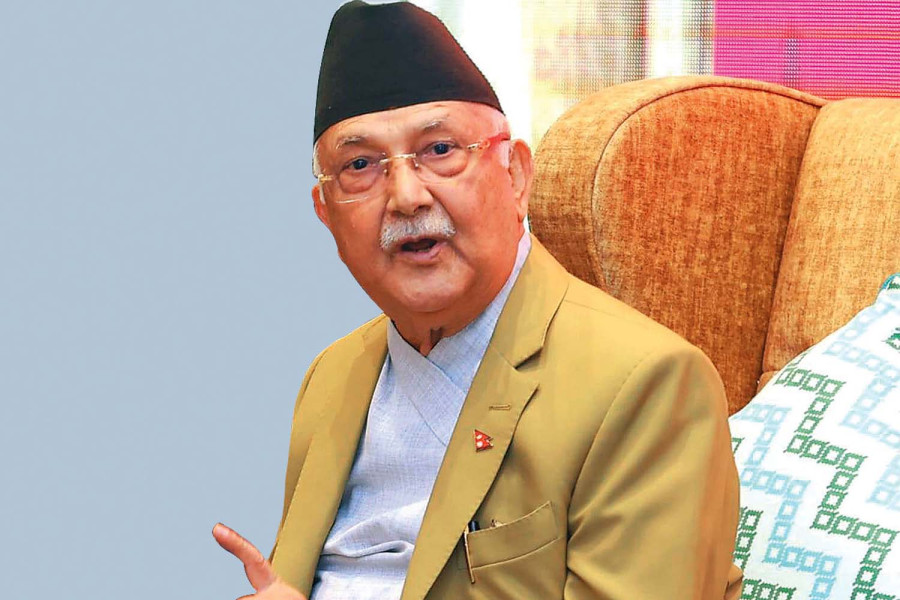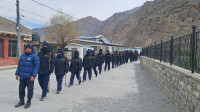Politics
Oli opens fronts against Maoist Centre, new parties, royalists and Kathmandu mayor—all at once
Asks party members to counter the narrative being set against his party UML.
Post Report
In one address at a function on Saturday, Prime Minister KP Sharma Oli fired salvos at the CPN (Maoist Centre), supporters of monarchy, the political forces that emerged from the 2022 elections and Kathmandu mayor Balendra Shah.
Oli and his party CPN-UML are engaged in a tussle with these four forces—the main opposition Maoist Centre, people campaigning for the restoration of monarchy that was abolished in 2008, new political parties and Kathmandu’s independent mayor for various reasons, mainly after Oli became the prime minister in mid-July.
Oli didn’t say anything against the Nepali Congress, the UML’s main competitor but now a partner in the current coalition government.
The Maoist party and its leaders have become aggressive against the UML, particularly after Oli pulled out of the Pushpa Kamal Dahal-led government in July and became prime minister with the support of Congress.
Of late, lawmakers from the two communist parties are engaged in heated exchanges in the House of Representatives. They have intensified attacks against each other mainly after UML Secretary Yogesh Bhattarai, addressing the House meeting on August 28, termed the Maoist insurgency ‘violence’ while Maoists call it the People’s War. Maoist Centre lawmakers promptly objected to Bhattarai’s use of the word and demanded the Speaker’s ruling to expunge the ‘unparliamentary word’ from parliamentary records. However, Speaker Devraj Ghimire, who got elected from the UML, ruled on Wednesday that the term wasn’t unparliamentary so there was no need to remove it from the records.
The issue has now become a major irritant between the two largest communist parties. A parliamentary party meeting of the CPN (Maoist Centre) on Friday decided to continue its House obstruction until the word ‘violence’ is removed from record.
Oli, on the other hand, claimed that his party, UML, has the potential to win a single majority in the elections to be held in 2027 and urged the party leaders and cadres to jointly prepare for that. A central secretariat meeting of the party on Friday approved an action plan to build the party into a ‘decisive national force’ from the next general elections.
“We have a solid foundation to make the mission-2084 [2027] successful by winning a majority in the elections,” Oli said at the party function in Kathmandu on Saturday. “If mission-2084 does not succeed, then no one will know what happens after 2084 BS. No one knows what changes will happen and who will be thrown where.”
Oli claimed that the Maoist Centre, Dahal’s party which is now a distant third force, will further shrink after the new elections. He went on to say that the Maoist Centre could lose half its proportional votes from its last count of over a million and might struggle to become a national party from next elections.
“In their first election, the Maoists received 3.1 million votes. By next elections, they received only 1.4 million votes. In the third, they received 1.3 million votes. Last elections, they received over 1.1 million votes in total,” Oli said, citing a newspaper report. “By the next elections, they could receive around 400,000 to 500,000 votes. They will struggle to become a national party.”
Then the prime minister took a jibe at the monarchists saying that a large force was now active against the new constitution of Nepal.
Some forces lobbying for the reinstatement of Hindu kingdom in the country are regrouping of late. Durga Prasai, a controversial medical entrepreneur from Oli’s hometown Jhapa, is one leading such movement.
Oli once nominated Prasai as a UML central committee member. He was sacked after he started attacking Oli and other UML leaders. Prasai has not stopped attacking Nepali leaders, mainly from the old parties, but the UML has been his unmistakable target.
“Some reactionary forces are trying to weaken the UML in a bid to complicate the situation. We are surrounded by reactionary elements and those who are against this constitution,” he said.
Stating that there was an unprecedented build-up of support for a feudal, despotic and authoritarian monarchy, Oli said: “Unknowingly, some people are trying to create a negative atmosphere. Instead of following truth and facts, they have resorted to lies, illusions, conspiracies and tricks.”
Oli also alerted his party workers to the elements allegedly trying to disrupt the law and order situation.
Oli then attacked new political forces such as the Rastriya Swatantra Party, the Janamat Party and the Nagarik Unmukti Party. Oli described them as forces having grown overnight to eat the pie of old forces.
He urged party members to remain vigilant as the new parties had taken away votes from the UML’s bank.
“Where did our votes go last election? The groups that did not exist earlier were born and ate the rice from our plates. How did the rice get into their mouths? That’s why we have to be watchful,” said Oli.
Once coalition partners, the UML and the Rastriya Swatantra Party are now at a verbal war in Parliament, especially after Oli’s party proposed unseating Deputy Speaker Indira Rana. Rana, who was elected from the RSP, has landed in a controversy after revelation that she requested the Kathmandu-based Embassy of the United States to expedite visa interviews for five individuals unrelated to her office. UML first raised the issue in Parliament and asked Rana to resign as deputy Speaker alleging her misconduct.
The prime minister also criticised Balendra Shah, the mayor of Kathmandu Metropolitan City, on Saturday.
He called the mayor “a boy who speaks randomly”.
“A new boy came to the scene suddenly. He speaks randomly, like a crazy person but some say he must not be touched. People asked us not to touch him because he has a strong support base. If we don’t correct him, he will continue his propaganda against us,” Oli said, urging his supporters to counter the negative messaging against the party.
In June first week, Mayor Shah accused UML chair Oli of committing ‘policy corruption’ while trying to swap the land of Giri Bandhu Tea Estate in Jhapa. The same month, the mayor and UML leaders clashed over jurisdiction as the metropolis expanded a sidewalk in the New Road area.
The mayor and UML leaders are once again at loggerheads over implementing a Supreme Court verdict that prohibits construction on an additional 20 metres on either side of a river in Kathmandu Valley.
Shah often criticises Oli and the UML through social media posts and UML cadres have been countering him. Large numbers of social media users seem to be supporting Shah while criticising the establishment and traditional forces.
The UML is a party with a large number of cadres equipped with a mobile phone, said Oli. “Why aren't our people coming out and writing against our opponents?”




 13.24°C Kathmandu
13.24°C Kathmandu














